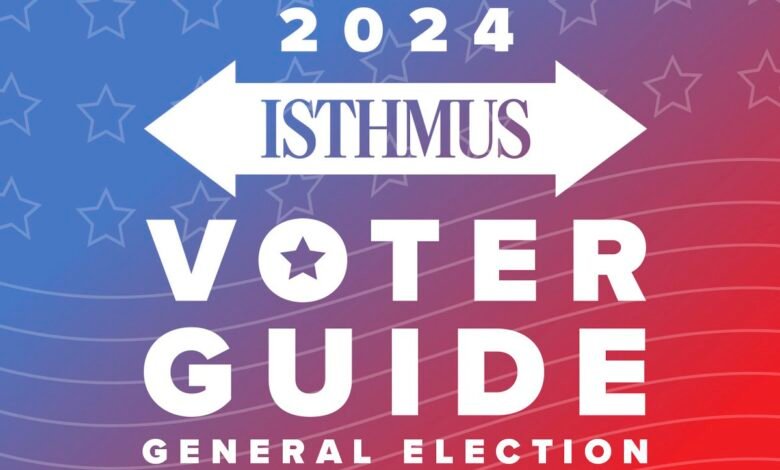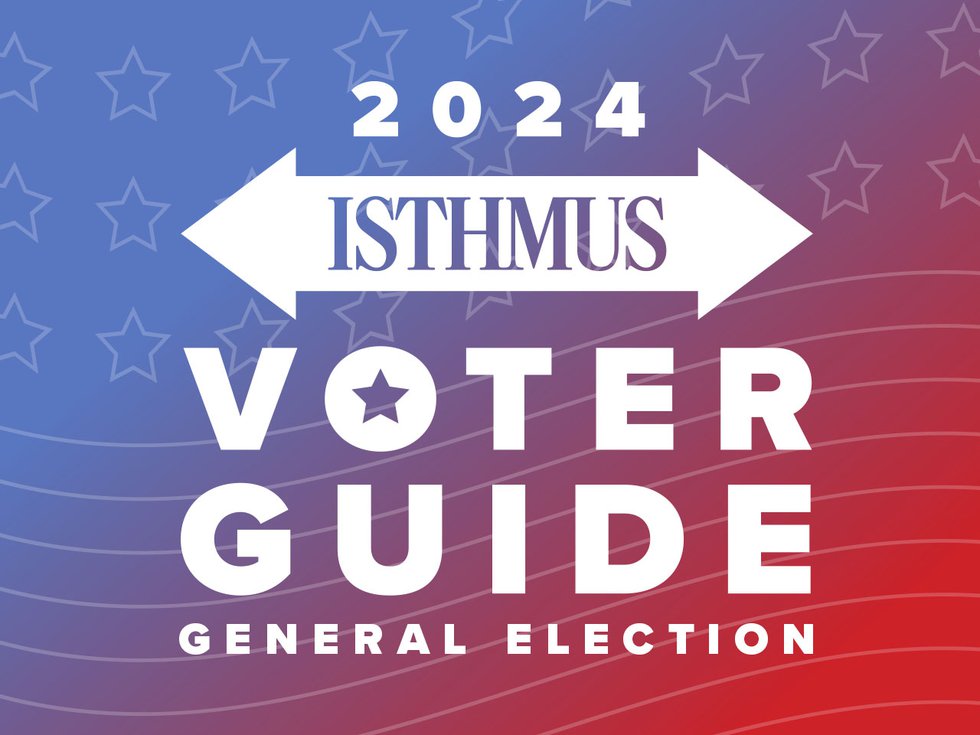2024 Isthmus General Election voter guide – Isthmus


Wisconsin is a key battleground state for the presidency in the general election on Nov. 5. Other high-profile races — from Tammy Baldwin’s U.S. Senate seat to the open race for Dane County executive — are on the ballot, too.
This guide breaks down what voters need to know, whether they plan to vote early or on Election Day. We have included links to our election coverage and websites where voters can find out their polling place and see what’s on their ballot. With this resource citizens should have what they need to exercise their right to vote, and there should be no surprises at the ballot box.
Constitutional amendments
There is one proposed amendment to the state Constitution on the November ballot. Everyone in Wisconsin will vote on the following ballot referendum:
Question 1. “Eligibility to vote. Shall section 1 of article III of the constitution, which deals with suffrage, be amended to provide that only a United States citizen age 18 or older who resides in an election district may vote in an election for national, state, or local office or at a statewide or local referendum?”
If voters approve the referendum question, it will be enshrined in the state Constitution that noncitizens are prohibited from voting in Wisconsin. But this is already covered by federal law and ensured by the broad checks and balances set in place by the Wisconsin Department of Motor Vehicles, which issues Wisconsinites’ IDs, and the Wisconsin Elections Commission. Only three noncitizens in Wisconsin have been referred for prosecution for illegally voting since 2019, according to PBS Wisconsin.
Republicans broadly support the amendment and say it is a necessary preventative measure, as the District of Columbia and some municipalities in California, Maryland and Vermont permit noncitizens to vote solely for state or local elected positions.
“From the debate on this issue last session I know some legislators believe this is unnecessary, but this is a simple straightforward solution to a problem that threatens our constituents most fundamental right, voting,” Republican Sen. Julian Bradley of New Berlin, who was among the senators who introduced the amendment, said in an October 2023 letter to the Assembly Committee on Campaigns and Elections.
Democrats say the amendment would unnecessarily drum up anti-immigrant bigotry over unfounded claims of election fraud and intimidate U.S. citizen voters.
“I’m trying to wrap my brain around what people think the motivation would be for a noncitizen to go through an enormous amount of hassle to actively commit a felony to vote in an election that’s going to end up putting them in prison or be deported,” Democratic Rep. Lee Snodgrass of Appleton, the ranking Democratic on the Assembly Committee on Campaigns and Elections, said during a May 2024 hearing.
Budget referendum questions
There are three budget referendum questions on the Nov. 5 ballot: a city of Madison operating budget referendum and Madison Metropolitan School District operating and capital budget referendums. An operating budget supports day-to-day costs, usually staffing, for a local government, while capital budgets support long-term infrastructure and building projects.
By approving a budget referendum, voters give a local government permission to raise residents’ property taxes by the amount indicated in the referendum question, either on an ongoing basis or as a one-time increase.
All city of Madison voters will weigh in on the following budget referendum, which would increase property taxes by $230 annually on an average $457,300 Madison home on an ongoing basis:
“Under state law, the increase in the levy of the City of Madison for the tax to be imposed for the next fiscal year, 2025, is limited to 2.97%, which results in a levy of $296,149,162. Shall the City of Madison be allowed to exceed this limit and increase the levy for the next fiscal year, 2025, for the purpose of funding police, fire, garbage collection, parks and library operations and other City services and operations, by a total of 7.4%, which results in a levy of $318,149,462, and on an ongoing basis, include the increase of $22,000,000 for each fiscal year going forward?”
You can read more about the city of Madison budget referendum in the following stories: $22 million referendum to plug Madison’s budget hole will be on Nov. 5 ballot | Explainer: What is a budget referendum, and why is Madison considering one? | More opponents than supporters in initial public feedback on potential Madison budget referendum.
Everyone within the boundaries of the Madison Metropolitan School District will vote on the following two budget referendums, which would add an additional $300 to an average value Madison home in 2025 and more than $1,300 by 2028. The operating budget referendum would allow the school district to raise $100 million in property taxes by 2028, with a $20 million annual increase remaining in place thereafter, while the capital budget referendum would permit MMSD to raise up to $507 million in property taxes for capital projects.
Question 1: “Shall the Madison Metropolitan School District, Dane County, Wisconsin be authorized to exceed the revenue limit specified in Section 121.91, Wisconsin Statutes, by $30 million for the 2024-2025 school year; by an additional $30 million for 2025-2026 school year, by an additional $20 million for the 2026-2027 school year; and by an additional $20 million (for a total of $100 million) for the 2027-2028 school year and thereafter, for recurring purposes consisting of operational and maintenance expenses, including for educational programming and employee compensation and benefits?”
Question 2: “Shall the Madison Metropolitan School District, Dane County, Wisconsin be authorized to issue pursuant to Chapter 67 of the Wisconsin Statutes, general obligation bonds in an amount not to exceed $507 million for the public purpose of paying the cost of a school building and facility improvement project consisting of: renovations, construction of school buildings and/or additions, including air conditioning and heating improvements, and for science, technology, engineering and mathematics (STEM) labs and classrooms, the arts, libraries, cafeterias, and co-curricular, activity and shared community spaces at Malcolm Shabazz City High School, Milele Chikasa Anana Elementary School, Black Hawk Middle School, Cherokee Heights Middle School, Crestwood Elementary School, Samuel Gompers Elementary School, Orchard Ridge Elementary School, Ray F. Sennett Middle School, Sherman Middle School and Akira R. Toki Middle School; possible related demolition; district-wide accessibility, safety, environmental sustainability and building infrastructure improvements; and acquisition of furnishings, fixtures and equipment?”
You can read more about the MMSD referendums in the following story: Funding requests for Madison school district will be on November ballot.
Presidential race
Eight presidential candidates will appear on the Nov. 5 ballot:
Vice President Kamala Harris, Democrat
Former President Donald Trump, Republican
Randall Terry, Constitutional Party
Chase Oliver, Libertarian Party
Jill Stein, Wisconsin Green Party
Claudia De la Cruz, Party for Socialism and Liberation
Cornel West, Justice for All Party
Robert F. Kennedy Jr., We The People Party
U.S. Senate
Four candidates are vying for the U.S. Senate seat held by two-term Tammy Baldwin: Baldwin, the incumbent Democrat; Republican Eric Hovde; Disrupt the Corruption candidate Phil Anderson; and America First Candidate Thomas Leager. See Chasing Wisconsin’s Independent Voters.
Congressional races
Mark Pocan, the Democratic incumbent, and Republican Erik Olsen will face off to be Wisconsin’s congressional District 2 representative.
State races
Most Madison-area state level Democratic candidates are running unopposed in the general election. Two Madison-area state level races include Republican challengers: the 48th Assembly District, where Democrat Andrew Hysell will face off against Republican Lisa Rubrich, and the 80th Assembly District, where Democratic incumbent Rep. Mike Bare will face off against Republican challenger Robert Relph.
County executive race
Two candidates are vying to be Dane County executive in November’s special election — the winner will be Dane County’s new executive for six months, before facing reelection in April 2025 for a full four-year term.
Both state Sen. Melissa Agard and RCC: Sexual Violence Resource Center Director Dana Pellebon say they hold progressive values.
A county executive serves as the head of county government. In Wisconsin, counties act as “arms of the state,” according to the nonpartisan research group Wisconsin Policy Forum, and provide crucial services in such domains as transportation, health, safety and more.
County executives are elected on a nonpartisan basis. They have authority over all county agencies and draft the annual county budget — in addition, they can veto county board decisions.
You can read more about county executive race in the following articles: Agard, Pellebon survive Dane County executive primary | What the candidates running for Dane County executive have to say on key issues. | What could a new Dane County executive do to address the housing crisis?
Local races
The four local county government positions on the ballot are uncontested at this time: Dane County District Attorney Ismael Ozanne, Dane County Treasurer Adam Gallagher, Dane County Register of Deeds Kristi Chlebowski, and Dane County Clerk Scott McDonell.
Voting on Election Day
I’m already registered
If you’re already registered to vote, you can show up to vote in-person on Election Day, Nov. 5. MyVote WI has a tool to check whether you’re registered and at what address. You can also check where your polling place is and what’s on your ballot. Polls open at 7 a.m. and close at 8 p.m. You will need to bring a photo ID, which does not need to show your current address.
You can also prepare and bring notes about who you want to vote for into the booth. You can take and share photos of yourself voting, but cannot show your marked ballot to others. If you have a disability, you can vote “curbside,” in your vehicle or at the entrance to the polling place, with the assistance of poll workers.
I need to register
If you’re not registered to vote, you can register at your polling place on Election Day. In order to register, you will need proof of residence. The Madison City Clerk’s Office maintains a list of what counts as valid proof of residence, such as pay stubs or a bank statement, which can be shown in either paper or electronic form. UW and Madison College students can verify their residence through their student center portals (UW | Madison College). MG&E customers can login to their account and show their electronic utility bill.
Online and mail voter registration end on Oct. 16, but voters who still need to register after can do so in person at any in-person absentee voting locations (list), or the City Clerk’s Office until Nov. 1, or register at the polls on Election Day. State law prevents residents from registering to vote on the Saturday, Sunday or Monday before the election.
Voting Before Election Day
I’m already registered
Vote by mail: If you are registered to vote, you can request an absentee ballot and return the completed ballot by mail, at an absentee ballot drop box, or in-person to the City Clerk’s Office at 210 Martin Luther King Jr. Blvd. Your request for an absentee ballot must be received by the City Clerk’s Office by 5 p.m. on Oct. 31 — though if you request it that late, it may not come in time for Election Day — and your completed ballot must be received by the City Clerk’s Office by 8 p.m. on Election Day for it to count.
That means that the earlier you can send it off, the better. The City Clerk’s Office recommends returning ballots by mail by Oct. 28. You can also bring your completed ballot to a dropbox or to your polling place on Election Day.
Vote early in-person: Early in-person voting, also called in-person absentee voting, starts on Oct. 22. To vote early in person, you will need to bring a photo ID. The City Clerk’s Office maintains a list of in-person absentee voting locations and the hours they are open. In-person absentee voting is available from Oct. 22 to up to Nov. 3 — office hours depend on your municipal clerk. You can check MyVote for more information.
I need to register
Register in-person: You can register to vote at your municipal clerk’s office until Nov. 1. In order to register, you will need to bring proof of residence. The Madison City Clerk’s Office maintains a list of what counts as valid proof of residence, such as a pay stub or a bank statement, which can be shown in either paper or electronic form. UW and Madison College students can verify their residence through their student center portals (UW | Madison College). MG&E customers can login to their account and show their electronic utility bill.
Register online or by mail: Online and mail registration close on Oct. 16, per a state law that only allows in-person registration for 20 days before an election.
Other Frequently Asked Questions
I don’t have a photo ID. How do I get one?
The city maintains a list of the documentation you will need to apply for a voter ID, including proof of citizenship, residence, identity, and name and date of birth.
The Dane County Voter ID Coalition — a collaboration between the League of Women Voters Dane County and the Dane County NAACP — is helping voters get IDs ahead of the election, providing transportation and help with the application at two Madison DMV locations. If you have more questions, you can call or text the Voter Helpline at 608-285-2141.
Where do I vote? What is going to be on my ballot?
Find where to vote here. See what will be on your ballot here.
Can I return my ballot via drop box?
The Wisconsin Supreme Court restored the ability to return your ballot to an absentee ballot drop box on July 5. In the city of Madison, you can drop your ballot off at any of the city’s 14 fire stations or at the Elver Park Shelter. A full list of Madison drop box locations is available here.
If I have a disability, can I receive my ballot electronically?
Due to a June 25 injunction issued by a Dane County judge, voters who self-certify that they have a disability are legally permitted to receive and fill out their ballot electronically, though the ballot still needs to be printed and returned in-person or via mail. Voters are allowed to receive assistance in returning the ballot.
The injunction is currently on appeal from a number of Republican legislators in Waukesha, making its future legal status shaky.
How can I find out about the candidates?
Isthmus interviewed the then-four county executive candidates in July — you can find our article, including interviews with final candidates Pellebon and Agard, here.
The Capital Times conducted a series of livestreamed candidate forums for nearby state-level races, which you can view here.
WORT-FM 89.9 interviewed all of the county executive candidates — you can listen to the interviews here.
Ballotpedia publishes an overview of all candidates and ballot measures on the November ballot, which you can find here.
Who is funding the candidates?
You can see county candidates’ campaign finance reports here.
You can view finance reports for state campaigns using the Wisconsin Campaign Finance Information System here.
Other voting guides
The League of Women Voters of Wisconsin’s voting guide can be found here. A Spanish version of the League of Women Voters’ guide is available here.
Voters can also get help in Spanish or English on general voting questions by calling the League of Women Voters of Wisconsin’s Voter Helpline: 608-285-2141.




